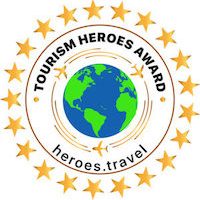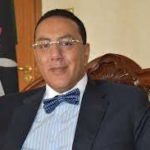Hon. Secretary Najib Balala, Kenya
Secretary of Tourism, Kenya
Tourism is one of the world’s leading industries and a major economic development tool, and as such, security (crime and terrorism) has a major impact on the tourism, cruise, and event-oriented economies. Additionally, much of the entire world has been impacted by the Covid-19 pandemic and its effects on tourism have been devastating.
The government of Kenya takes great pride in its tourism industries. Kenya is known around the world for its natural beauty, its variety of attractions and the hospitality of its people. The tourism industry provides not only for the people of Kenya a major economic development took but it also help to improve the nation’s quality of life for all of Kenya’s citizens.

Due to the tourism industry Kenya can take great pride in that many of its public officials are tourism-sensitive, they tend to be more tolerant of the needs of diverse populations, and they seek to offer the general public better service.
In today’s Covid-19 pandemic tourists, as do citizens throughout the world, demand safety and security by well-trained professionals. They understand the relationship between safety, security, reputation, economic viability, and health. These five factors when combined are called tourism surety. Each of these factors is essential in winning a Safer Tourism Seal and demonstrating that the awarded entity does everything possible in the way of tourism surety. It must be underscored that there is no 100% safety and security in the world. It is for this reason that our seal is called “safer tourism”. It indicates that the entity awarded such a seal has established a dynamic program, that permits continual upgrades to its surety program and realizes that new measures must be introduced as the situation warrants.
It is for this reason Rebuilding Tourism offers its Safer Tourism Seal only to tourism entities, businesses and locales which recognize that the hospitality industry’s number one job is to protect its guests.

Basic concepts of tourism surety
The Kenyan Ministry of Tourism in discussions with Rebuilding Tourism has demonstrated that it understands that tourism surety involves training, education, investments in software and the understanding that security/surety is not a simplistic discipline. In an age of great change and challenges ranging from issues of health to security the Kenyan ministry of tourism has demonstrated that it accepts the fact that its tourism personnel will have continual training and must be flexible enough to adjust their procedure to a constantly changing environment.
The ministry has indicated that it has involved itself in creating a safer tourism product and one that demonstrates to the visitor that the nation is doing everything possible to create a safe, secure and healthy environment by working with international agencies, by participating in regional agencies such as the African Tourism Board and by interacting with tourism security and wellbeing specialists.
The Kenyan Ministry of tourism has indicated that it is taking proactive measures to assure visitors of the safest tourism experience possible. The ministry well understands that no one can assure 100% safety and security and that no one shall fall ill. What it can do is provide the best tourism surety measures possible. For this reason the government reports that:
- It has created and updates it health and surety protocols on a timely and regional basis
- It has implemented realistic health, sanitation, disinfection, distancing, and safety protocols that are both affordable and pro-active
- It is following international social distancing guidelines both for staff and visitors and working to create touchless solutions whenever possible. Te touchless policy also means that whenever possible technology is to be used to decrease physical interactions in hotels, restaurants, places of transportation etc.
- The ministry of tourism understands the importance of providing PPE (Personal protective equipment) throughout the tourism industry. This inclusion is for staff and employees and also for guests upon request. PPE materials are offered free of charge
- The Kenyan Tourism Ministry recommend the wearing of masks when personal interactions mean that people are in situations in which they are less than 2 meters from each other. Masks are used in public transportation and indoor settings
- The Ministry is requesting the frequent washing of hands and the sanitization of hotel rooms and other public locations or apparatuses used by the public.
- The government of Kenya is working to provide hand-sanitizers in accordance to the needs of the public and tourism industry
- The ministry is encouraging all tourism locales and business to install physical separation barriers such as the use of plexiglass and at the same time to be sensitive to the nation’s ecological and climatic needs.
- The government of Kenya through its tourism ministry is paying special attention to transportation hubs such as airport terminals and insists on international transportation centers and business such as airlines to comply with the International Civil Aviation Organization’s “Takeoff: Guidance for Air Travel through the COVID-19 Public Health Crisis”
- The Kenya Tourism Ministry understands that as the situation unfolds or changes that its policies may also have to change so as to protect visitors to the fullest extent possible.
In order to control the COVID-19 pandemic the government announced on August 12, 2020 according to the United States Embassy in Kenya the following additional protocols have been established:
- The cessation of movement order that barred entry into and out of Nairobi, Mombasa and Mandera counties lapsed on July 7th.
- ·On July 6 the GoK announced that the prohibition against social and political gatherings is extended for an additional 30 days.
- Bars are closed until further notice. There are no sales of alcoholic drinks and beverages in eateries and restaurants throughout Kenya effective July 28th. The closing time for restaurants and eateries was amended from 8pm to 7pm as of July 28th, for the next 30 days.
- Places of worship may begin phased re-opening in conformity with applicable guidelines developed by the Inter-Faith Council. As outlined on July 6, guidelines mandate a maximum of one hundred (100) participants allowed at each worship ceremony and must not be more than one hour in duration. In-person worship shall not include congregants under age thirteen (13) years or over fifty-eight (58) or persons with underlying health conditions. Sunday schools and madrassas will remain suspended until further notice.
- On May 16th, movement restrictions were imposed into and out of Kenya through the Kenyan-Tanzania and Kenyan-Somali international borders, with exceptions for cargo vehicles.
These 10 principles as stated above should help to: Assure that the nation meets World Health Organization guidelines and as such ensure a safe experience for visitors/guests and service providers. By doing the above the Kenyan Ministry of Tourism will seek to rebuild national, regional and international trust in the safest tourism experience possible.


